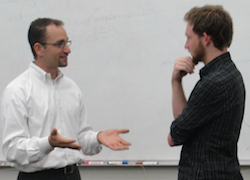Black Velvet, If You Please….Is Sustainability the New Religion?
I gave up on organized religion a long time ago. While I didn’t have any idea “what else”, I knew my path didn’t lie with any one faith.
Growing up Catholic, I had an epiphany perhaps as early as age 10 that it just didn’t seem right that any one religion could be “right” more so than any other, and that the mutual exclusivity of ours and other faiths left little wiggle room for good people to enter the kingdom of heaven if they chose the “wrong” religion.
Later in life, when I started to see religion co-opted in the political process, I lost even more faith in the systems in place and the people behind organized religions. After all, to conclude that Jesus would side with the same Republican party that protects the economic interests of ExxonMobil, Monsanto, Halliburton and the rest of the worst corporate citizens in the world…it’s just a bit much.
Easter Sunday has perhaps inspired me to consider the decline of organized religion and the rise of the “nones”. Time Magazine recently covered the growing trend in which people are increasingly responding “none of the above” when asked which religion they ascribe to. By any measure you choose, “none” would be the fastest growing religion over the last 20 years. The number of “nones” out there now ranks in the 16% range, more than doubling in that time.
Sustainability is the ultimate purveyor of the one guiding principle that binds most religions: the golden rule.

Cockroaches are superior to humans in many biological aspects: they can survive months with no food or water, and will survive a nuclear winter if there ever is one.
I recall the spiritual gap that I felt when I chose to give up on Catholicism. It is a palpable feeling that there may not really be anything else out there. As a “none”, do I just go through life thinking that I am no different than a zebra or a fish? Cut off our oxygen and we’ll die just like the zebra. Deprive us of food, and we’ll last no longer than a housecat in a similar starvation. In other words, biologically speaking, we’re not the favorites. A great scene from the TV show Heroes had the Professor Mohinder Suresh giving a lecture about God, citing that if God had really created the most magnificent creature on earth in his own image, that perhaps…God is a cockroach.
But it’s not that people are rejecting faith, according to the article in Time. Only 4% of Americans say they are atheist or agnostic, leaving a full 12% of the “nones”out there somewhere exploring something new. Religion and spirituality give us that sense that there is more to it than that, and as such provide hope for many that their lives really will amount to something more than just a biological creature dependent on food, water, shelter, and oxygen.
As I celebrated Easter today the way that I’ve celebrated Christmas, Easter, and every other major Catholic holy day for the last 20 years (going outside and being in nature), it occurred to me that sustainability is…in a way…my religion.
It’s sometimes referred to as ecopsychology, but the zen-like calm and the spiritual connection to something I know but can’t understand that comes with going outside and just…being…is as powerful as any feeling I can imagine getting through a more traditional religious service. Musty pews and the sit-stand-kneel-sit-stand-kneel rituals of the Catholic Church never resonated with me (and for that matter most of my peers in high school), but I find that going through an asana series in my yoga classes gives me a similar feeling that some people might ascribe to the spiritual lift they get from their faith.
Theologian Ninian Smart’s seven dimensions of religions describe conventional religions: Ritual, Narrative and Mythic, Experiential and Emotional, Social and Institutional, Ethical and Legal, Doctrinal and Philosophical, Material. While sustainability lacks much of the rigidity inherent in these elements, it does follow the pattern more closely than I’d even considered. Yoga aside, there is undeniable inner peace and bliss that results in witnessing the beauty of farm-to-fork agriculture, the spinning of wind turbines, or feeling the breeze in my hair when I bike to work. Much of this is inexplicable by any conventional logic, which is the fundamental tenet of the concept of “faith”, when it boils down to it.
There is a social and institutional element of sustainability. When I encounter colleagues from other countries and other parts of the US that profess this faith of sustainability, I’m often floored to see how many of the same books they’ve read, how many of the same documentaries they can quote, and the fact that they often carry reusable utensils, water bottles, and cloth napkins in their briefcase or other packs, just like I do. And perhaps most importantly, the group of sustainability advocates that have become my default family out here in Hawaii (far removed from my biological family) work tirelessly to drive forward our “faith”. We believe, with every grain of our being, that we can make the world a better place, and that we have the tools to help make it happen. We spread the word, we do good deeds, we help others to help themselves….much as any spiritual leader has done.
But perhaps most of all, sustainability is the ultimate purveyor of the one guiding principle that binds seemingly every religion: the golden rule. Treat others as you would like to have them treat you. In sustainability, we strive to create a better world for our children, our peers, our non-human partners, and whether you believe in a Gaia life force or not, the planet that provides the essentials of life to us every day.
…and it’s ok.
Perhaps more than any other holdover from my early days in the Catholic faith is the guilt. It’s funny in some ways, but is an undeniable truth. And for many years, I’ve felt an intense guilt about even having this thought that sustainability was somehow equal or akin to religions that are thousands of years old. Finally, I believe I’ve accepted that if there is a God, he or she would not only not send us to an eternal damnation, but would likely find some synergy in what we’re doing, and what has always been done. After all, if you believe that God created the heavens and the earth, do we have any other choice but to be the stewards of what we have before us?
Sustainability ties me to future generations in a way that nothing else ever has. Much of what I do will outlive me, like the fruit trees I’ve planted, the energy efficiency work I’ve done, and the education of others in environmentalism and sustainability. Why I do something that I will not see the benefit of can only be explained fully by a concept that is somehow bigger than me, and the 73.2 years that I’m expected to live on this earth.
Photos courtesy of zoomy photography and myyogaonline on Flickr Creative Commons
Scott Cooney
Scott Cooney (twitter: scottcooney) is an adjunct professor of Sustainability in the MBA program at the University of Hawai'i, green business startup coach, author of Build a Green Small Business: Profitable Ways to Become an Ecopreneur (McGraw-Hill), and developer of the sustainability board game GBO Hawai'i. Scott has started, grown and sold two mission-driven businesses, failed miserably at a third, and is currently in his fourth. Scott's current company has three divisions: a sustainability blog network that includes the world's biggest clean energy website and reached over 5 million readers in December 2013 alone; Pono Home, a turnkey and franchiseable green home consulting service that won entrance into the clean tech incubator known as Energy Excelerator; and Cost of Solar, a solar lead generation service to connect interested homeowners and solar contractors. In his spare time, Scott surfs, plays ultimate frisbee and enjoys a good, long bike ride. Find Scott on Google Plus

Get your signed copy of
Build a Green Small Business (McGraw-Hill)!
Or...talk with the author!
Click here to schedule an hour consultation.
 Green franchise opportunities:
Other green business ideas
Green franchise opportunities:
Other green business ideas
- Healthy Fast Food
- Farmer's Market
- Personal Trainer & Diet Planner
- Juice Bar and Smoothie Café
- Green Building Materials Store
- Permaculture and Urban Farming
- Edible and Organic Floristry
- Energy Efficiency Auditing
- Ecotourism and Sustainable Travel Planner
- Sustainable Coffee House
- Consignment Shop for Kids Clothing & Toys
- Natural Foods Co-op
- Sustainable Food Prep and Cooking Instruction
- Food Plant Nursery
- Mesh Network Telephone and Internet Company
- Drive-thru Coffee Stand & Espresso Shop
- Eco-Friendly House Cleaning Service
- Organic Backyard Garden Landscape Design
- Green Bed and Breakfast (B&B)
- Sustainable Mobile Food Vendor
- Biodiesel Cooperative
- Eco Friendly Pool and Spa Cleaning
- Green Wedding and Sustainable Event Planner
- Organic Farm
- Gift Basket Service
- Pedicab Company
- Used Books Vending Machines
- Organic Day Spa
- Restaurant Food Delivery Service
- Used Bicycle Retailer
- Landscape Maintenance in Arid climates
- Organic Food Delivery Service
- Outdoor Gear Consignment Shop
- Eco Concierge Service and Relocation Specialist
- Organic Community Supported Agriculture
- Sustainable Property Management
- Residential Solar



